A Non-Comprehensive List of Books by/about People of Color
- The DaVinci
- Feb 16, 2021
- 7 min read
Updated: Oct 26, 2021
Violet T.
2.15.2021
(THE DAVINCI-CHARLOTTESVILLE) - February is here, and alongside it comes Black History Month. Following the events of last summer, the US (and the world, for that matter) have all been acutely tuned in to matters of racial injustice, though frustratingly, that awareness has begun to fade. I, too, am guilty of letting myself slip back into the “normal” routine; paying less attention to racial injustices.
In an attempt to bring more attention back to the Black Lives Matter movement, I have compiled a list of books authored by people belonging to the Black community. The list is divided by genre, ranging from books about racial injustice and self-education to fiction and fantasy. All reviews in italics are taken from Goodreads.
It is important to consider, while browsing the list, that racial injustice, racial inequity, and police brutality exist beyond Black History Month.
Educational Books About Race
--So You Want to Talk About Race by Ijeoma Oluo--
Ijeoma Oluo is an American writer who has been published in prominent news outlets and magazines, such as the Guardian, Jezebel, and the Medium. Her novel, So You Want to Talk About Race, is highly rated and frequently recommended for its valuable and extensive information on the black experience and modern racial inequity.
In this breakout book, Ijeoma Oluo explores the complex reality of today's racial landscape--from white privilege and police brutality to systemic discrimination and the Black Lives Matter movement--offering straightforward clarity that readers need to contribute to the dismantling of the racial divide.
In So You Want to Talk About Race, Editor at Large of The Establishment Ijeoma Oluo offers a contemporary, accessible take on the racial landscape in America, addressing head-on such issues as privilege, police brutality, intersectionality, microaggressions, the Black Lives Matter movement, and the "N" word. Perfectly positioned to bridge the gap between people of color and white Americans struggling with race complexities, Oluo answers the questions readers don't dare ask, and explains the concepts that continue to elude everyday Americans.
Oluo is an exceptional writer with a rare ability to be straightforward, funny, and effective in her coverage of sensitive, hyper-charged issues in America. Her messages are passionate but finely tuned, and crystalize ideas that would otherwise be vague by empowering them with aha-moment clarity. Her writing brings to mind voices like Ta-Nehisi Coates and Roxane Gay, and Jessica Valenti in Full Frontal Feminism, and a young Gloria Naylor, particularly in Naylor's seminal essay "The Meaning of a Word."
--How To Be An Antiracist By Ibram X. Kendi--
Ibram X. Kendi is a prominent writer, antiracism activist, historian, and a co-author of the popular book Stamped. How To Be An Antiracist discusses the idea of racism vs. “nonracism” in comparison to racism vs. antiracism, arguing that changing our mindsets to the latter is one step on the way to an antiracist society.
Ibram X. Kendi's concept of antiracism reenergizes and reshapes the conversation about racial justice in America--but even more fundamentally, points us toward liberating new ways of thinking about ourselves and each other. In How to be an Antiracist, Kendi asks us to think about what an antiracist society might look like, and how we can play an active role in building it.
In this book, Kendi weaves together an electrifying combination of ethics, history, law, and science, bringing it all together with an engaging personal narrative of his own awakening to antiracism. How to Be an Antiracist is an essential work for anyone who wants to go beyond an awareness of racism to the next step: contributing to the formation of a truly just and equitable society.
--Don’t Touch My Hair By Emma Dabiri--
Emma Dabiri can tell you the first time she chemically straightened her hair. She can describe the smell, the atmosphere of the salon, and her mix of emotions when she saw her normally kinky tresses fall down her shoulders. For as long as Emma can remember, her hair has been a source of insecurity, shame, and—from strangers and family alike—discrimination. And she is not alone.
Despite increasingly liberal world views, black hair continues to be erased, appropriated, and stigmatized to the point of taboo. Through her personal and historical journey, Dabiri gleans insights into the way racism is coded in society’s perception of black hair—and how it is often used as an avenue for discrimination. Dabiri takes us from pre-colonial Africa, through the Harlem Renaissance, and into today's Natural Hair Movement, exploring everything from women's solidarity and friendship, to the criminalization of dreadlocks, to the dubious provenance of Kim Kardashian's braids.
Through the lens of hair texture, Dabiri leads us on a historical and cultural investigation of the global history of racism—and her own personal journey of self-love and finally, acceptance.
Newbery Winners
--Roll of Thunder, Hear My Cry By Mildred D. Taylor--
An older book set during the Great Depression, Roll of Thunder, Hear my Cry revolves around the life of Cassie Logan, a young African-American girl, and her family, the racism they face in their daily lives, and Cassie’s love for her family’s land. Roll of Thunder, Hear My Cry is a go-to book for middle school teachers, a Newbery Winner, and a deeply moving classic children’s novel.
Why is the land so important to Cassie's family? It takes the events of one turbulent year—the year of the night riders and the burnings, the year a white girl humiliates Cassie in public simply because she's black—to show Cassie that having a place of their own is the Logan family's lifeblood. It is the land that gives the Logans their courage and pride—no matter how others may degrade them, the Logans possess something no one can take away.
--Long Way Down By Jason Reynolds--
Written by Jason Reynolds, who co-authored Stamped alongside Ibram X. Kendi, Long Way Down discusses themes of teenage gun violence in verse--taking place in the time it takes the main character to complete a single elevator ride.
A cannon. A strap. A piece. A biscuit. A burner. A heater. A chopper. A gat. A hammer. A tool for RULE.
Or, you can call it a gun. That’s what fifteen-year-old Will has shoved in the back waistband of his jeans. See, his brother Shawn was just murdered. And Will knows the rules. No crying. No snitching. Revenge. That’s where Will’s now heading, with that gun shoved in the back waistband of his jeans, the gun that was his brother’s gun. He gets on the elevator, seventh floor, stoked. He knows who he’s after. Or does he? As the elevator stops on the sixth floor, on comes Buck. Buck, Will finds out, is who gave Shawn the gun before Will took the gun. Buck tells Will to check that the gun is even loaded. And that’s when Will sees that one bullet is missing. And the only one who could have fired Shawn’s gun was Shawn. Huh. Will didn’t know that Shawn had ever actually USED his gun. Bigger huh. BUCK IS DEAD. But Buck’s in the elevator? Just as Will’s trying to think this through, the door to the next floor opens. A teenage girl gets on, waves away the smoke from Dead Buck’s cigarette. Will doesn’t know her, but she knew him. Knew. When they were eight. And stray bullets had cut through the playground, and Will had tried to cover her, but she was hit anyway, and so what she wants to know, on that fifth floor elevator stop, is, what if Will, Will with the gun shoved in the back waistband of his jeans, MISSES.
And so it goes, the whole long way down, as the elevator stops on each floor, and at each stop someone connected to his brother gets on to give Will a piece to a bigger story than the one he thinks he knows. A story that might never know an END…if WILL gets off that elevator.
--The Crossover By Kwame Alexander--
"With a bolt of lightning on my kicks . . .The court is SIZZLING. My sweat is DRIZZLING. Stop all that quivering. Cuz tonight I'm delivering," announces dread-locked, 12-year old Josh Bell. He and his twin brother Jordan are awesome on the court. But Josh has more than basketball in his blood, he's got mad beats, too, that tell his family's story in verse, in this fast and furious middle grade novel of family and brotherhood.
Josh and Jordan must come to grips with growing up on and off the court to realize breaking the rules comes at a terrible price, as their story's heart-stopping climax proves a game-changer for the entire family.
Books about the Black Experience
--Barracoon By Zora Neale Hurston--
Barracoon is the true story of the final surviving man to be captured, enslaved, and taken to America--told through his interviews with the author, Zora Neale Hurston. It covers his life in West Africa, as an enslaved man, Cudjo, and his life following the freedom of enslaved Africans/ African-Americans. The novel discusses the difference in the stark differences between Cudjo’s culture and that of Americans, the racism and racial brutality that existed following the emancipation of black people in America, and the community he ultimately found and built. Barracoon is a book I absolutely recommend to all those who have not yet read it.
In 1927, Zora Neale Hurston went to Plateau, Alabama, just outside Mobile, to interview eighty-six-year-old Cudjo Lewis. Of the millions of men, women, and children transported from Africa to America as slaves, Cudjo was then the only person alive to tell the story of this integral part of the nation's history. Hurston was there to record Cudjo's firsthand account of the raid that led to his capture and bondage fifty years after the Atlantic slave trade was outlawed in the United States.
In 1931, Hurston returned to Plateau, the African-centric community three miles from Mobile founded by Cudjo and other former slaves from his ship. Spending more than three months there, she talked in depth with Cudjo about the details of his life. During those weeks, the young writer and the elderly formerly enslaved man ate peaches and watermelon that grew in the backyard and talked about Cudjo's past--memories from his childhood in Africa, the horrors of being captured and held in a barracoon for selection by American slavers, the harrowing experience of the Middle Passage packed with more than 100 other souls aboard the Clotilda, and the years he spent in slavery until the end of the Civil War.
Based on those interviews, featuring Cudjo's unique vernacular, and written from Hurston's perspective with the compassion and singular style that have made her one of the preeminent American authors of the twentieth-century, Barracoon masterfully illustrates the tragedy of slavery and of one life forever defined by it. Offering insight into the pernicious legacy that continues to haunt us all, black and white, this poignant and powerful work is an invaluable contribution to our shared history and culture.
--Stamped By Jason Reynolds and Ibram X. Kendi--
While this was a summer reading option (for those reading within the Renaissance School Community), I wanted to recommend it again for those who did not read it (including myself).
--Americanah By Chimamanda Ngozi Adichie--
YA, Fantasy, Misc
--Raybearer By Jordan Ifueko--
--Pride By Ibi Zoboi--
--War Girls By Tochi Onyebuchi--
All reviews in italics are taken from Goodreads.


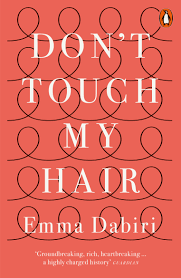

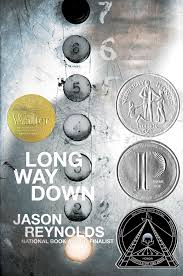

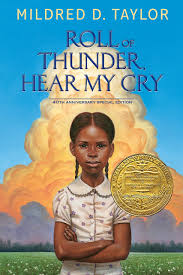

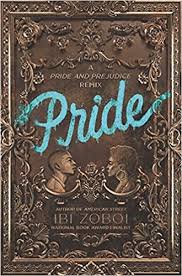

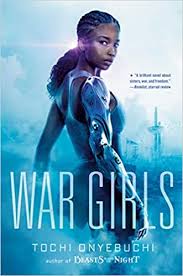

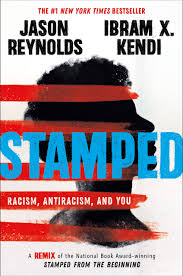

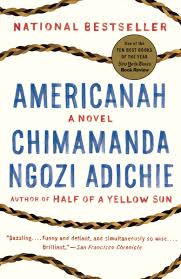

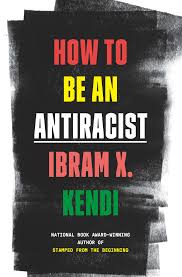

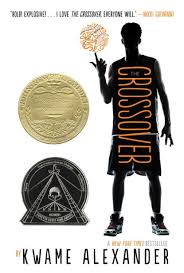

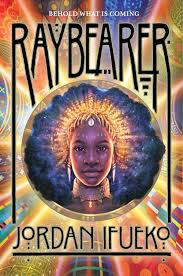

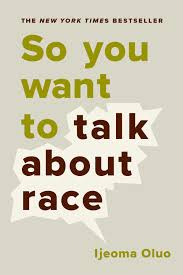

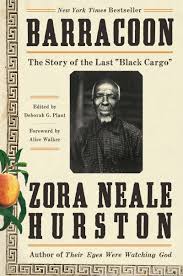



Comments